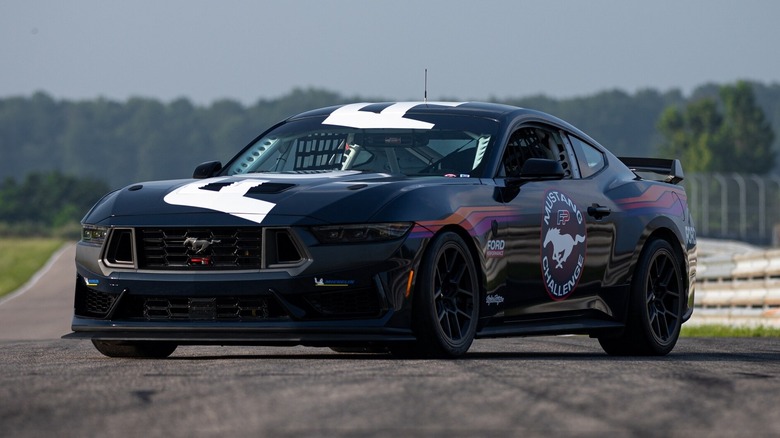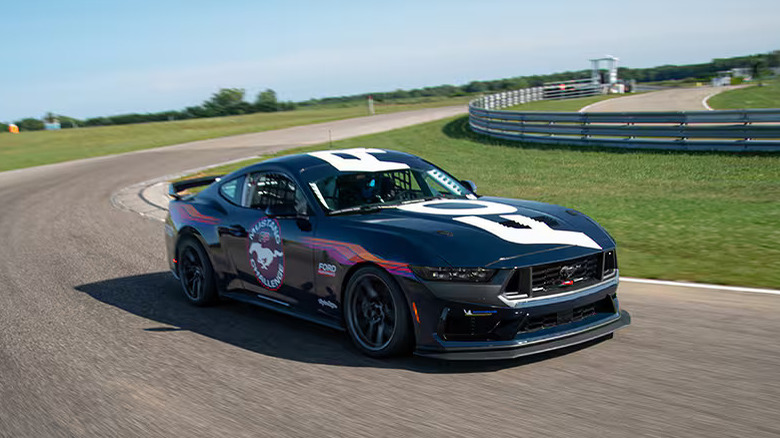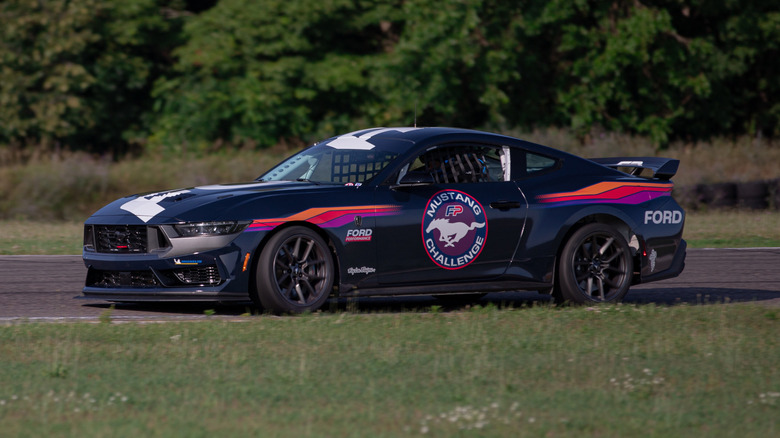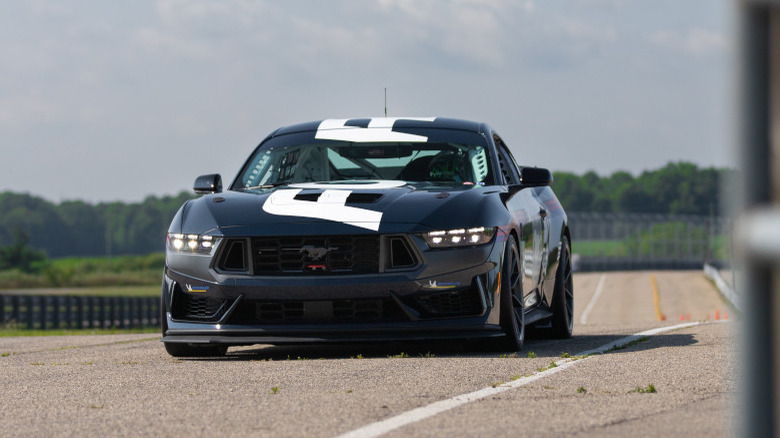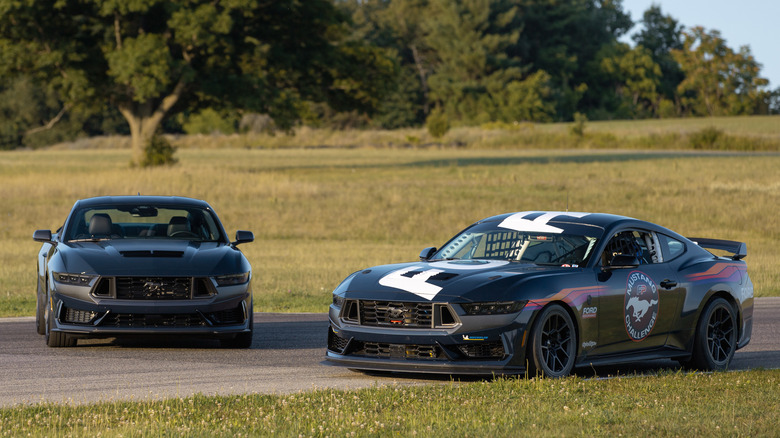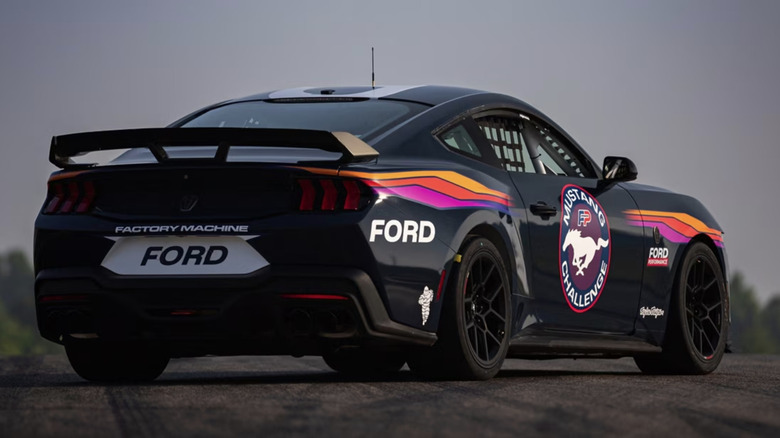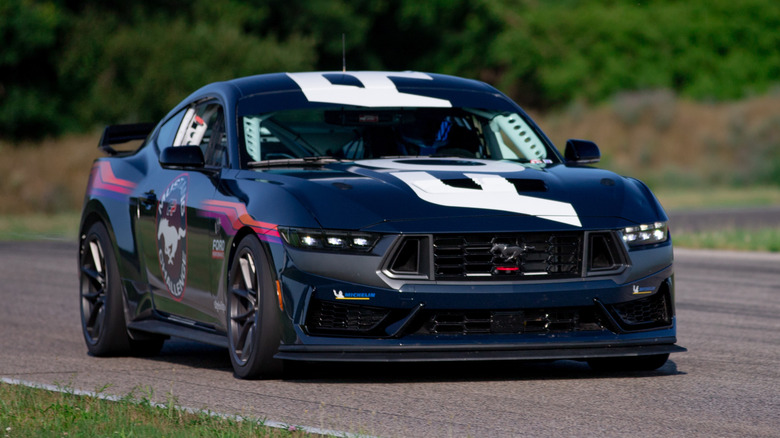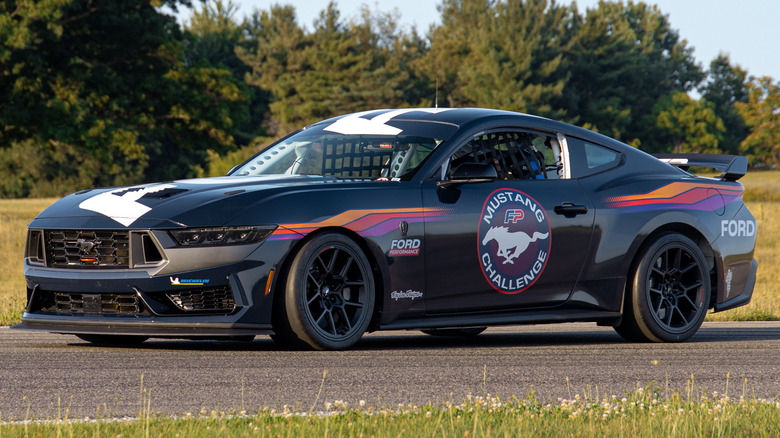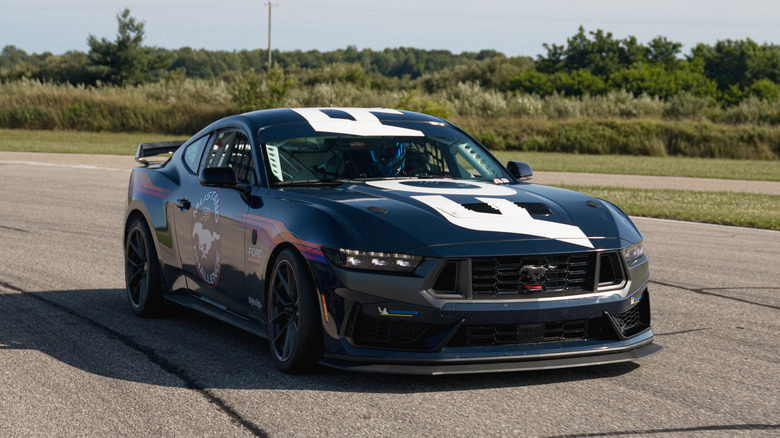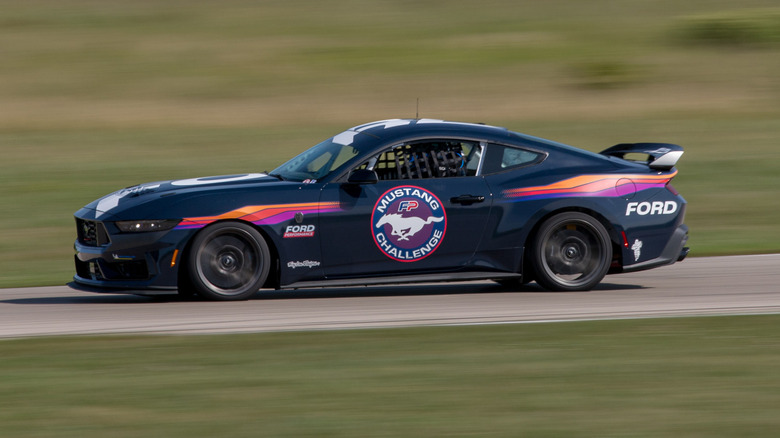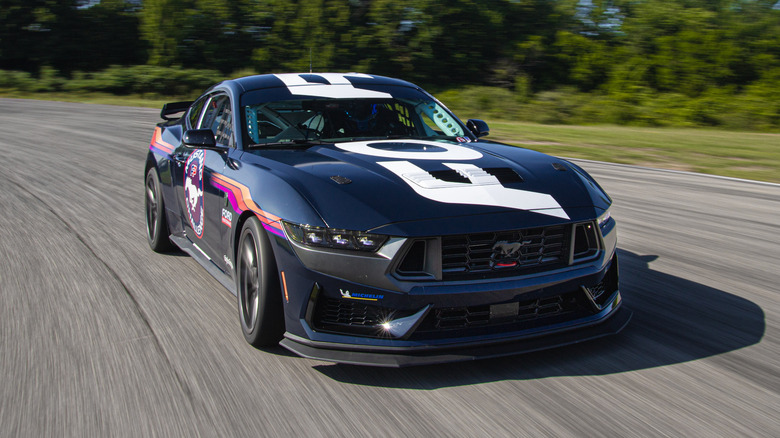10 Reasons The Ford Mustang Dark Horse R Is Such An Expensive Car
Ford's new Mustang Dark Horse is expensive as far as Mustangs go with a base price of just under $60,000, while options can take it well past the $70,000 mark. That's rarefied territory for a Mustang, especially compared to the $30,000 you'd pay for an entry-level Mustang Ecoboost Fastback. You'd be forgiven for thinking that $70,000 is the most you could ever spend on a modern Mustang, but you'd be dead wrong. Say hello to the Mustang Dark Horse R.
The Mustang Dark Horse R is a turn-key race car that starts at a cool $145,000. It's easily the priciest Mustang in Ford's 2024 stable and, believe it or not, is even more expensive than a fully specced-out 2022 Ford Mustang Shelby GT500. Unlike the Shelby, you can't even drive it on the road!
If you're looking at that eye-watering price tag and asking what it gets you, you've come to the right place. Here, you'll see why the Ford Mustang Dark Horse R costs what it does and why someone would be so crazy as to drop six figures on a track-only race car.
It has a trick suspension
The standard Ford Mustang Dark Horse already has a fancy MagneRide suspension, but the Dark Horse R takes it one step further with Multimatic's Dynamic Suspensions Spool Valve (DSSV) dampers. These extremely reliable, high-performance dampers are fully adjustable, letting the driver adjust the suspension geometry to suit whichever track they're racing on.
Multimatic's DSSV suspension technology is common on high-performance road and race cars, with Ferrari, Porsche, and Aston Martin all opting for Multimatic suspensions in their high-end offerings. This isn't the first time Ford and Multimatic have worked together, either: Multimatic helped Ford assemble the second-generation Ford GT, including the crazy track-only Ford GT Mk IV and its high-tech adaptive suspension.
One reason DSSV dampers are so popular on high-end performance cars is their reliability. While they still manage suspension movement using pistons moving through hydraulic fluid, DSSV dampers do away with the metal discs that usually control fluid flow. Instead, they use spool valves with laser-cut openings. These spool valves resist wear and tear better than the metal discs in conventional dampers, improving reliability and longevity.
Add fully adjustable front camber plates and anti-roll bars into the mix, and you get a high-end, race-spec suspension setup that surely costs a pretty penny. But that's what a track car like the Ford Mustang Dark Horse R demands.
Safety doesn't come cheap
Safety is paramount in all cars but is especially crucial in high-performance race cars. Ford has introduced a raft of upgrades to the Mustang Dark Horse R to bring it up to spec for racing and ensure drivers are well-protected in case of a crash.
The Mustang Dark Horse R features a full roll cage with select seam welding on the chassis to ensure safety during collisions and rollovers. There's also a Recaro FIA racing seat with Sparco FIA racing harnesses to keep the driver safe and snug. At the same time, Safecraft FIA safety nets protect the driver's head against lateral movements. Ford has opted for top-shelf safety gear here, and rightly so.
A Sparco FIA fire suppression system is also standard on the Mustang Dark Horse R, as is a heavy-duty fuel cell that will survive impacts and crashes better than a standard fuel tank. If a driver needs to get out in a hurry, the Dark Horse R also has a quick-release Sparco steering wheel, as is standard on modern racing cars.
Safety equipment can get expensive, and this gear undoubtedly represents a big chunk of the price premium over a standard Mustang Dark Horse. The upshot of these upgrades, though, is that they make the Ford Mustang Dark Horse R eligible to compete in racing series across North America — all while keeping drivers safe from harm.
It has its own race series
A track-only race car needs a race series to take part in, and Ford has one ready for the lucky ones able to afford a Mustang Dark Horse R. The Mustang Challenge is a fully IMSA-sanctioned single-make race series that all owners of a Mustang Dark Horse R can take part in. Racers will compete in two classes, Dark Horse and Dark Horse Legends (for drivers 45 years and older), vying for cash prizes and a $100,000 scholarship for a Mustang GT3 or GT4 seat in 2025.
Ford's Mustang Challenge will take competitors all across North America, with five rounds and 10 races at some of the USA's most iconic racetracks. The series kicks off at the Mid-Ohio Sportscar Course in Lexington, Ohio, in early June before visiting New York's legendary Watkins Glen International later in the month.
In August, the series visits Wisconsin's Road America and Circuit of the Americas (COTA) in Austin, Texas, with the latter running alongside a 2024 FIA World Endurance Championship weekend. Finally, the Mustang Challenge closes out with racers duking it out at Indianapolis Motor Speedway in early October. Like the COTA weekend, the Indianapolis round is a companion event, happening concurrently with the 2024 Indianapolis 8-Hour race.
You're not just buying a high-performance Mustang when you buy the Dark Horse R — you're also paying for the privilege of racing in a competitive, one-make series at some of America's best-loved circuits. If that doesn't get you excited, then the Ford Mustang Dark Horse R might not be for you.
An upgraded powertrain
Horsepower is essential for racing, but it's not the be-all-end-all of a track car. Having a reliable powertrain is just as important, and that's precisely what Ford opted to focus on with the Mustang Dark Horse R. Ford has installed an upgraded dry-sump oiling system and a Ford Performance oil pan, which combine to maintain consistent oil delivery even during heavy cornering. Oil starvation is the last thing any race car needs; these upgrades ensure it won't happen.
Ford also modified the transmission and differential cooling systems on the Mustang Dark Horse R. Full-throttle racing puts extreme strain on the drivetrain, and there's no point in having a ton of power if other parts of the powertrain can't handle the heat. These cooling upgrades are essential to keep the Coyote V8's power flowing to the rear wheels without fail.
Speaking of power, the Mustang Dark Horse R sports the same 500 horsepower and 418 ft-lb V8 Coyote engine from the road-going Mustang Dark Horse. It's more powerful than all the other non-Shelby V8s Ford has made thus far and should have more than enough power for track use. Would it have been nice to see some extra horsepower for the extra outlay over the road-going Mustang Dark Horse? Sure, but power isn't everything for a track car. Ford's powertrain upgrades should help keep Dark Horse Rs on track, improving the overall racing experience for all owners.
A free-flowing exhaust
Race cars don't have to worry about the noise and emissions regulations road-legal vehicles are subject to, so they can afford less restrictive exhaust systems. These do without the catalytic converters and sound-dampening material that help keep road-legal cars on the right side of the law, and that's what Ford has gone for on the Mustang Dark Horse R.
The Mustang Dark Horse R comes with an exhaust system from exhaust masters Borla, a company well-known for manufacturing aftermarket exhaust parts and systems for Ford Mustangs. Borla sells exhausts for everything from the old 1999 Ford Mustang Cobra up to the monster 5.2-liter 2023 Ford Mustang Shelby GT500, so it makes sense that Ford went with Borla for the Dark Horse R's exhaust.
The Borla exhaust on the Ford Mustang Dark Horse R sounds loud and raunchy, precisely how a race car should. Gone are the multiple exhaust settings of the road-going car: the Dark Horse R has one mode, and it's loud. Interestingly, Ford doesn't claim any performance benefits from the less-restrictive exhaust system, but it sure sounds great.
Borla exhausts don't come cheap, especially for high-performance vehicles. For example, a complete Borla exhaust system for the 2020 Shelby GT500 costs more than $3,000. While race exhausts technically have less material than street-legal exhausts, we still don't think it will be any cheaper than that. Add another few thousand to Ford's manufacturing costs for the Dark Horse R, then.
Top-spec brakes
Racing isn't just about how fast a car is but also about how well it can slow down for corners. Ford's road-going Mustang Dark Horse is already a champion here, with MotorTrend recording a 60 to 0 mph stopping distance of only 86 feet. That puts the Dark Horse at the top of the leaderboard for shortest stopping distances, out-braking even heavy hitters like the 2018 Porsche 911 GT2 RS and 2016 Dodge Viper ACR.
While the road-going Dark Horse's six-piston and two-piece Brembo front brakes obviously do an excellent job, Ford went a step further and upgraded the brakes for even better braking performance and reliability on the track. So out go the road-going Brembo discs and calipers, with higher-quality race-grade Brembo parts installed in their place, including six-piston forged monobloc calipers. Front and rear brakes also get new Brembo racing brake pads, while new air cooling ducts help keep the front brakes cool under heavy braking.
Ford has upgraded more than just the brakes themselves, too. The Mustang Dark Horse R gets a new performance anti-lock braking (ABS) system to ensure racers don't lock their wheels up under heavy braking. All these braking modifications should give the Ford Mustang Dark Horse R a huge advantage over its road-legal stablemate, guaranteeing it'll be ready for the on-track challenges it'll encounter.
Fancy wheels and tires
The Mustang Dark Horse R comes with Ford Performance Parts R1 Flow-Formed Wheels. As the name suggests, these great-looking wheels use the flow-forming manufacturing process, which results in lighter, more durable wheels than the cast wheels we see on most mainstream vehicles. Lighter wheels help reduce unsprung weight, which in turn helps improve suspension behavior and grip. As such, it's clear why Ford opted for flow-formed wheels on a track car like the Mustang Dark Horse R.
Flow-formed wheels start similarly to cast wheels, where a molten aluminum alloy is poured into a mold. However, flow-formed wheels come out of the casting process smaller and thinner than standard cast wheels. Manufacturers then heat the wheel and use machines to spin it and compress it into its final shape. The thinner and smaller starting dimensions give flow-formed wheels their weight advantage over cast wheels. Flow-formed wheels are a great middle point between basic cast and high-end forged wheels. They offer significant advantages over cast wheels without the sheer cost of forged wheels, which can cost up to $6,000 each.
Ford ships the Mustang Dark Horse R with standard street tires, but owners will want to opt for Michelin's 19" race slicks. These are custom tires designed specifically for the Mustang Challenge race series. Ford sells these tires separately, so you'll be spending more than just $145,000 if you want to take your Mustang Dark Horse R racing.
Important body modifications
While the Dark Horse R retains most of the aero of the base Dark Horse, it has some essential modifications that befit its race car status. The most apparent additions are front and rear tow hooks, which are the red hoops you can spot jutting out from the bumpers. These do precisely what the name suggests — offer hooks that teams and track marshals can use to tow the car. These are essential for moving the Mustang off-track and back to the pits when it breaks down or ends up in a gravel trap.
Underbody tie-down hoops are another race-critical addition to the Mustang Dark Horse R's body. The Dark Horse R isn't road-legal, so owners can't drive it from track to track; instead, they'll have to transport their Mustangs on trailers. These tie-down hoops offer convenient points to tie the Dark Horse R down with straps and stop it from moving around during transportation. This keeps the Mustang Dark Horse R safe from harm and the trailer stable on the road.
Finally, reinforced jacking points make sure that repeated jacking up of the car for repairs, maintenance, or suspension setting adjustments won't risk damaging the all-important chassis. Chassis integrity is essential for all cars, especially race cars, so reinforcing the common jacking points is a no-brainer. Even if none of these modifications are massively exciting, but they're just as important to a race car as all the others. They combine with all the other upgrades to make the Mustang Dark Horse R the turn-key race car that it is.
Race-ready data logging
Data is king in racing, as it helps engineers see whether a car is performing at its best and identify problems or aspects of its setup they need to work on. That's where data loggers like the Ford Mustang Dark Horse R's Motec data display and logging system come into the picture.
The Motec display logger unit in the Mustang Dark Horse R serves two functions. First, it serves as the instrument cluster, with its customizable digital display showing all the information a driver needs, such as engine RPM, the currently selected gear, and various temperature and pressure readouts. Motec units can even track the current lap time and compare it to a reference one, indicating the driver's pace in real time.
However, it's the information that the Motec unit records and stores in its onboard memory that truly makes it worth its weight in gold. Motec data loggers connect directly to the car's electronic control unit (ECU) and other sensors to provide vital telemetry to race teams and engineers. For example, the ECU provides the Motec unit with information about air-to-fuel ratio, exhaust gas temperature, throttle position, and coolant temperatures, amongst other measurements. Race teams can then process this information using Motec's i2 data analysis software to track the Mustang Dark Horse R's behavior and identify areas where the car (or driver) needs improvement.
High-end Motec data loggers don't come cheap, with prices hovering around the $6,000 mark for the highest-end units. That's another hefty bit of extra expenditure that Ford is passing onto buyers with that $145,000 list price for the Mustang Dark Horse R.
Track-ready cars are just expensive
The Ford Mustang Dark Horse R may cost more than double that of the road-going Ford Mustang Dark Horse, but Ford is far from the only company charging a significant premium for a track-ready version of a car. Mazda pulled a similar trick with the MX-5 Cup car, which costs around $60,000 compared to the $30,000 of a basic Mazda MX-5. Then there's Porsche, whose $229,000 718 Cayman GT4 Clubsport carries a huge price premium over the road-going 718 Cayman GT4, which costs a positively affordable $108,000 in comparison.
This isn't to imply that these prices are unreasonable or unjustified, mind you. As we've seen, there are many reasons why a track-only car like the Mustang Dark Horse R costs what it does. However, these prices are important because they show that Ford has no real incentive to try to keep the Dark Horse R's price down compared to its road-legal sibling.
Anyone interested in a turn-key track car knows, and probably expects, that they'll be spending a considerable chunk of money on it. So, Ford could spend what it needed on upgrades, parts, and R&D to create the best possible version of the new Mustang, knowing that it could pass the cost on to well-heeled customers. Sure, $145,000 is a lot of money, but it's not a bad price for a track car that's ready to go the moment it's delivered.
